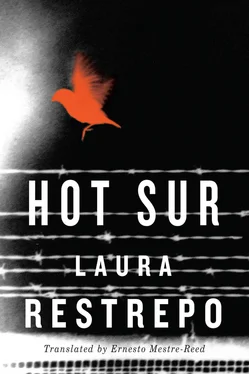Socorro told Rose that this was the subject of some of the seventeen pages that she had to burn.
There in the factory, after five in the afternoon, when her friends the Dominicans had left, as had all the others, and Bolivia was done with her ironing, the poor thing had to take care of another kind of manual labor.
“Olvenis?” Rose asked.
“Something like that.”
“A work slave and a sexual slave.”
“This was her misfortune.”
“And did she ever have fun, your friend Bolivia?” Rose asked. “Did she ever go to the movies? She must have gone dancing sometimes.”
“Well, she needed all the money she could bring in.”
“To bring her daughters.”
“Yes, and please swear you won’t repeat this, but the truth is that at a crucial junction, Bolivia was even a teibolera .”
“A what?”
“Teibolera. I didn’t know the term either. Teibolera, a woman who dances on teibols , or tables. Topless, they call it, you know how it goes”—Socorro lowered her voice, as if she were whispering a secret—“with her tits in the air. Bolivia’s were very full and could well be exploited. And all for bringing her daughters.”
“There’s something that doesn’t seem right,” Rose said. “Too much abnegation. Why had she left them in the first place?”
“It wasn’t really because they were hungry. It wasn’t really one of those cases where the mother can’t feed her kids. Not that bad. Back in Colombia her life was alright, with a family that helped her, all those aunts and cousins with map names, plus two jobs, several boyfriends, including the anonymous fathers of her daughters, and, modesty aside, she didn’t really miss me. I had my resources and once in a while sent something.”
“I see,” Rose said. “It wasn’t really an extreme case of hunger and misery.”
“Look, Mr. Rose, what she wanted was a dream life. She chased that dream. You know people like that?”
“But even to the point of leaving her daughters behind for five years?”
“It happens.”
“Could she have left her daughters behind because they were a nuisance?”
“Please, Mr. Rose, how can you say such a thing? Bolivia killed herself all those years trying to bring them over.”
“Abandoning your children could produce pangs of conscience in anyone. I know what I’m talking about. Bolivia punished herself working day and night, and so she banished the guilt of having left them. There are things one understands because one has lived them. But, not to be rude, I’m sure those missing seventeen pages said other things.”
“They did say something else. The most horrible thing for me. Those pages mentioned my husband.”
“Let me guess… Bolivia and Mr. Salmon? That’s where your fight with your friend stems from.”
“Bolivia was a meddler. And the older daughter is… like mother, like daughter, and I’m not making anything up. Before finishing off the poor cop, María Paz had skinned a few others.”
“Are you sure of that, Mrs. Salmon?”
“Well, not certain, can’t be certain, but it’s not hard to imagine. If she did it once, why not another time? Like I said, I have no proof, but that girl is something.”
“You’re letting your anger get the best of you. I understand you’re still smarting. Bolivia hurt you, and you are taking it out on her daughter. Isn’t that it? It’s very important that I know the truth. Think it over, do you have any basis for what you are insinuating?”
“Basis for what you are insinuating, good Lord, you sound like a detective. You’re scaring me.”
“I’m sorry, that wasn’t my intention. I just need to be clear about what happened, but don’t worry, it’s for personal reasons.”
“How about another tintico?”
“Yes, another tintico, perfect.”
“A little poison with it?”
“I’m sorry?”
“Do you want me to boost the tinto with a little aguardiente ?”
“That’s fine, Mrs. Salmon, poison the tintico, but listen, María Paz’s lawyer says she’s innocent.”
“Oh, Mother of God, that lawyer. He brought her here one day in that red sports car of his. If I were you, I wouldn’t put too much trust in that lawyer, who is not very professional to say the least.”
“María Paz was riding around with the lawyer in a red sports car?”
“Like I said, a red sports car.
“While she worked in the sweatshop, Bolivia realized that no one ever came to the door of the ironing room. Nobody went back there. So one morning when the heat was terrible, she decided to take off her shirt while she worked. The next day she took off her shirt and her skirt, and each time she grew more audacious, until she was ironing in just her brassiere and undies, and soon she was ironing wearing nothing, her body soaked in sweat and her hair dripping.
“Teibolera after all,” Socorro moralized. “My husband says you don’t play with that. Breasts are like mean dogs, you only let them loose in the house at night.
“With the spray for the jeans, Bolivia misted herself on her face and back, and in the days when she was most suffocating, she even stood in a tub of cold water. She made herself at home in the little ironing room, the only place where she could feel fresh in the summer, and warm in the winter, while the others shivered in the hall without heat. And she had always liked ironing and had done it well since she was a child. Her grandmother America had taught her to moisten the cloth with starch, perfume it with lavender water, and go over it with one of those heavy irons filled with hot coals, because the grandmother insisted on using it even though someone had given her an electric one, and it was with that iron that she taught her granddaughter, who years later would use the skill to survive in that country of dreams, which happened to have the same name as her grandmother. So Bolivia, while she took care of the mountains of jeans in the tiny ironing room, remembered her grandmother and took pains that each pair of jeans came out perfect. ‘Look, abuela,’ she said aloud, ‘this one came out nice, only fifty more, abuela, and now forty.’ And the grandmother seemed to respond from the beyond, Way to go, mi niña , don’t fade, there’s only thirty now, twenty, ten, you’re almost done. Alone there, in that small and enclosed space, miraculously private, Bolivia could even afford to dream and think of her daughters, imagine a reunion, once and again and again, a thousand times envisioning each detail of the moment when they’d reunite and become a family anew.
“But I’m testing your patience, sir. These women’s things must bore you — starch, ironing, lavender water, sewing machine. How can you be interested in all that?”
“They’re important, it’s work, life. I’m not bored. It’s what a person does to survive. They’re not women’s things; they’re human things. Go on, Mrs. Salmon. How long did Bolivia work in that factory?”
“Until she died, señor, until she died. My poor friend, Bolivia. I hope she has been able to rest in peace.”
“One last thing. The most important thing. The main reason for this visit. Can you tell me where she is?”
“Of course, she’s buried in St. John’s Cemetery. If you want to go visit, I’ll go with you. It’s been a—”
“María Paz is dead?”
“Not María Paz! God forbid! Bolivia. Bolivia died a while ago, and she is buried in St. John’s, St. John’s Cemetery in Queens.”
“But María Paz is alive?”
“Yes, as far as I know.”
“Please tell me where I can find her. It’s very important for me, for reasons that are difficult to explain.”
“You want to talk to her about the book, right?”
Читать дальше












